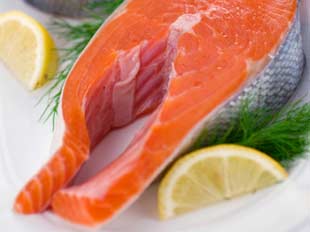Go Fish
 Of all the foods with confusing, conflicting health reports, fish may top the list. While you need their omega-3 fatty acids for optimum nutrition, some varieties contain potentially harmful levels of mercury, PCBs, and other toxins. To safely add seafood to your diet, follow these guidelines:
Of all the foods with confusing, conflicting health reports, fish may top the list. While you need their omega-3 fatty acids for optimum nutrition, some varieties contain potentially harmful levels of mercury, PCBs, and other toxins. To safely add seafood to your diet, follow these guidelines:
Can it. Shelf-stable seafood in pouches and cans is a convenient, popular source of protein. But some choices are better than others. For example, chunk light tuna contains less mercury than albacore. Better yet, opt for wild pink salmon, which offers 4 times the omega-3s and little or no mercury.
Get wild. Though wild salmon is a much better bet than its farmed cousins, other farmed seafood (clams, oysters, scallops) is just fine.
Take it easy, baby. Pregnant women and children are at the highest risk for damage from toxins, so be sure to choose wisely and don’t overconsume.
Most experts agree that the health benefits of seafood outweigh the risks. So go fish — once or twice a week.

